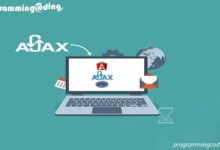Unlock the Power of Computer Programming: Your Ultimate Guide!

Unlock the Power of Computer Programming: Your Ultimate Guide!
Are you ready to embark on a journey into the fascinating world of computer programming? Dive into the limitless possibilities of coding and discover how this invaluable skill can empower you to shape the digital landscape. Join us as we unravel the secrets of computer programming and guide you towards success in this ever-evolving field.
1️⃣ What is Computer Programming? Computer programming is the art of creating instructions that tell a computer how to perform specific tasks. It involves writing, testing, and maintaining sets of instructions known as code, which serve as the building blocks for developing software, websites, mobile applications, and much more. With programming, you hold the key to unlocking the true potential of technology.
2️⃣ Why Learn Computer Programming? The demand for skilled programmers is skyrocketing across industries. By learning programming, you gain the power to develop innovative solutions, automate processes, and bring your ideas to life. Whether you dream of becoming a software engineer, a web developer, or an AI specialist, mastering programming opens doors to exciting career opportunities and a world of endless creativity.
3️⃣ Essential Programming Languages to Explore: There is an array of programming languages to choose from, each with its own unique features and purposes. Start your journey with foundational languages like Python, Java, or C++, which provide a solid understanding of programming concepts. As you progress, consider exploring specialized languages such as JavaScript for web development, Swift for iOS app development, or Python for data science and artificial intelligence.
4️⃣ Building Blocks of Programming: Understanding fundamental programming concepts is crucial for success. Dive into the world of variables, data types, control structures (if-else statements, loops), functions, and object-oriented programming (OOP). These building blocks form the foundation upon which you’ll construct powerful and efficient programs.
5️⃣ Learning Resources and Tools: Fortunately, there is a wealth of resources available to aid your programming journey. Online platforms like Codecademy, Udemy, and Coursera offer comprehensive courses that cater to different skill levels. Additionally, leverage coding communities, forums, and open-source projects to connect with fellow programmers, collaborate, and expand your knowledge base.
6️⃣ The Importance of Practice: Programming is a hands-on discipline, and practice is paramount. Apply your newfound knowledge to real-world projects, solve coding challenges, and embrace a growth mindset. As you encounter obstacles, persevere, and embrace the iterative process of problem-solving. The more you code, the more confident and proficient you’ll become.
7️⃣ Embrace the Growth Mindset: Remember, programming is a continuous learning journey. Stay curious, keep up with industry trends, and embrace new technologies and frameworks. The field evolves rapidly, so embrace lifelong learning to remain at the forefront of innovation.
By embarking on the path of computer programming, you unlock a world of infinite possibilities. Develop your skills, unleash your creativity, and become a driving force in shaping the digital landscape. Start your programming adventure today, and witness the transformative power of code.
Computer programming is the process of creating sets of instructions, known as code, that enable a computer to perform specific tasks or solve problems. It involves writing, testing, and maintaining these instructions to create software, websites, mobile applications, and other digital solutions.
At its core, computer programming is about giving machines the ability to understand and execute commands. Programmers use programming languages to write code, which serves as a communication bridge between humans and computers. These languages provide a structured way to express algorithms, logic, and data manipulation, allowing programmers to create functional and interactive software.
Programming languages can vary in syntax, capabilities, and purpose. Some popular programming languages include Python, Java, C++, JavaScript, Ruby, and many more. Each language has its own strengths and areas of specialization, making it suitable for different types of applications.
Computer programming is not just about writing code; it also involves problem-solving, critical thinking, and logical reasoning. Programmers analyze problems, break them down into smaller components, and design algorithms to solve them efficiently. They also debug and test their code to ensure it functions as intended.
The impact of computer programming is far-reaching. It powers the technology we use every day, from operating systems and web browsers to mobile apps and video games. It drives innovation in various fields, including artificial intelligence, data science, robotics, and cybersecurity.
Learning computer programming equips individuals with valuable skills for the modern digital era. It opens up opportunities for creative expression, empowers problem-solving abilities, and provides a foundation for careers in software development, web development, computer science, and related fields.
In summary, computer programming is the art and science of writing instructions that enable computers to perform specific tasks. It is a skill that empowers individuals to harness the power of technology and create solutions that shape our digital world.
Learning computer programming offers numerous benefits and opens up a world of opportunities. Here are some compelling reasons why learning computer programming is worth considering:
- Empowerment and Creativity: Programming gives you the power to transform your ideas into reality. It allows you to create software, websites, and applications, giving you a platform for creative expression and problem-solving.
- In-Demand Career Opportunities: The demand for skilled programmers continues to grow across industries. By learning programming, you gain access to a wide range of career opportunities in software development, web development, data science, artificial intelligence, cybersecurity, and more.
- Problem-Solving and Logical Thinking: Programming develops your problem-solving skills and enhances your ability to think analytically and logically. It teaches you to break down complex problems into smaller, manageable parts and design efficient solutions.
- Flexibility and Adaptability: Programming is a versatile skill that can be applied in various contexts. Whether you’re building a website, automating tasks, analyzing data, or creating mobile apps, programming provides you with the flexibility to adapt to different projects and technologies.
- Collaboration and Communication: Programming often involves working in teams and collaborating with others. Learning programming enhances your ability to communicate effectively, work collaboratively, and contribute to larger-scale projects.
- Automation and Efficiency: Programming enables automation, allowing you to streamline repetitive tasks and increase efficiency. By writing code to automate processes, you can save time and reduce errors, leading to increased productivity.
- Critical Digital Literacy: In an increasingly digital world, understanding programming concepts and technologies is becoming essential. Learning programming enhances your digital literacy, enabling you to better understand and navigate the digital landscape.
- Continuous Learning and Adaptation: Programming is a field that constantly evolves. Learning programming cultivates a growth mindset and encourages continuous learning. It enables you to keep up with emerging technologies, frameworks, and programming languages.
- Problem Solving Across Disciplines: Programming is not limited to computer science alone. It can be applied in various fields, such as finance, healthcare, engineering, and more. Programming skills allow you to tackle complex challenges and contribute to advancements in different domains.
- Future-Proofing: As technology continues to advance, programming skills become increasingly valuable. Learning programming equips you with a foundational skill set that can adapt to evolving technologies and prepares you for future career opportunities.
In summary, learning computer programming empowers you with a valuable skill set, enhances problem-solving abilities, opens up diverse career opportunities, and enables you to shape the future of technology. It offers the chance to unleash your creativity, contribute to innovative projects, and navigate the digital world with confidence.
When diving into the world of programming, there are several essential programming languages that you can explore based on your interests and goals. Here are a few popular ones:
- Python: Known for its simplicity and readability, Python is a versatile language used in web development, data analysis, artificial intelligence, scientific computing, and more. It has a large community and extensive libraries that make it beginner-friendly.
- JavaScript: Primarily used for web development, JavaScript enables interactivity and dynamic content on websites. It is a fundamental language for front-end development and can also be used for back-end development with frameworks like Node.js.
- Java: A robust and widely-used language, Java is known for its “write once, run anywhere” philosophy. It is used in building enterprise-level applications, Android apps, server-side development, and large-scale systems.
- C#: Developed by Microsoft, C# is a versatile language used for developing Windows applications, game development with Unity, and web development using ASP.NET. It is similar to Java in syntax and structure.
- C++: Known for its performance and efficiency, C++ is used in system programming, game development, embedded systems, and high-performance applications. It provides low-level control and is a foundation for other languages.
- Ruby: A user-friendly language with elegant syntax, Ruby is often associated with web development using the Ruby on Rails framework. It emphasizes simplicity, productivity, and readability.
- Swift: Developed by Apple, Swift is used for iOS, macOS, watchOS, and tvOS app development. It provides a modern and safe programming environment and is known for its intuitive syntax.
- Go: Created by Google, Go is designed for simplicity, concurrency, and scalability. It is used for building web servers, networked applications, and distributed systems, making it ideal for cloud-based projects.
- PHP: Primarily used for web development, PHP is a server-side scripting language that powers many websites, including popular content management systems like WordPress. It is easy to learn and widely supported.
- Rust: Known for its focus on memory safety and performance, Rust is used for system programming, embedded systems, and building highly reliable and efficient software.
Remember, the choice of programming language depends on your goals, project requirements, and personal preferences. Exploring these languages will provide a solid foundation and empower you to tackle a wide range of programming tasks. As you progress, you may explore additional languages and frameworks that align with your interests and career aspirations.
To become a proficient programmer, it’s important to understand the fundamental building blocks of programming. These concepts serve as the foundation for writing clean, efficient, and functional code. Here are some essential building blocks to focus on:
- Variables: Variables are used to store and manipulate data in a program. They have a name, a data type (such as integer, string, or boolean), and a value. Understanding how to declare, assign values to, and use variables is crucial in programming.
- Data Types: Different types of data (e.g., numbers, strings, booleans) are used in programming. Understanding data types allows you to manipulate and process data effectively. Common data types include integers, floating-point numbers, strings of characters, booleans, arrays, and objects.
- Control Structures: Control structures determine the flow of execution in a program. They enable you to make decisions and perform actions based on conditions. Common control structures include if-else statements, switch statements, loops (such as for loops and while loops), and conditional operators (such as AND, OR, and NOT).
- Functions: Functions are reusable blocks of code that perform specific tasks. They help break down complex programs into smaller, manageable parts and promote code reusability. Functions can take input (arguments) and produce output (return values) or perform actions without returning a value.
- Object-Oriented Programming (OOP): OOP is a programming paradigm that organizes code around objects that represent real-world entities. OOP concepts include classes, objects, inheritance, polymorphism, and encapsulation. OOP allows for modular and reusable code, making it easier to manage and maintain large-scale projects.
- Input and Output: Programs often need to interact with users or read and write data. Understanding how to handle input from users through methods like reading from the console or handling user interfaces, as well as outputting data to the screen or writing to files, is essential.
- Error Handling: Errors and exceptions can occur in a program. Knowing how to handle and manage these errors is crucial for creating robust and reliable software. Exception handling allows you to catch and handle errors gracefully, preventing program crashes and providing feedback to users.
- Algorithms and Data Structures: Algorithms are step-by-step procedures for solving problems, while data structures are ways of organizing and storing data efficiently. Understanding common algorithms and data structures, such as sorting algorithms, linked lists, stacks, and queues, helps optimize program performance and solve complex problems.
- Debugging and Testing: Debugging is the process of finding and fixing errors in code. Learning how to use debugging tools and techniques is essential for troubleshooting and improving program functionality. Testing involves writing and running test cases to ensure that the code behaves as expected and produces correct results.
Mastering these building blocks will provide you with a solid programming foundation. As you gain experience and tackle more complex projects, you’ll continue to refine and expand your understanding of these concepts. Practice, experimentation, and continuous learning are key to becoming a proficient programmer.
When it comes to learning computer programming, there is an abundance of resources and tools available to help you on your journey. Here are some valuable learning resources and tools to explore:
- Online Learning Platforms: Websites like Coursera, Udemy, edX, and Codecademy offer a wide range of programming courses and tutorials. These platforms provide structured learning paths, video lectures, coding exercises, and quizzes to enhance your understanding of programming concepts.
- Programming Books and eBooks: There are numerous programming books available, catering to all levels of expertise and covering various programming languages and concepts. Some popular titles include “Python Crash Course” by Eric Matthes, “Eloquent JavaScript” by Marijn Haverbeke, and “Clean Code: A Handbook of Agile Software Craftsmanship” by Robert C. Martin.
- Online Documentation and Resources: Programming languages often have comprehensive online documentation that serves as a valuable reference. Websites like MDN Web Docs for web development, the official Python documentation, and the Java documentation provide detailed explanations, examples, and usage guidelines for their respective languages.
- Coding Communities and Forums: Engaging with coding communities and forums can be immensely beneficial. Websites like Stack Overflow, Reddit’s programming communities, and GitHub provide platforms for asking questions, seeking guidance, and participating in discussions with experienced programmers.
- Coding Challenges and Practice Platforms: Platforms like LeetCode, HackerRank, and Codewars offer coding challenges that allow you to practice your programming skills. These platforms provide a variety of problem-solving scenarios and allow you to compare your solutions with others.
- Integrated Development Environments (IDEs): IDEs are software applications that provide a comprehensive programming environment. IDEs like Visual Studio Code, PyCharm, Eclipse, and IntelliJ IDEA offer features such as code editors, syntax highlighting, debugging tools, and project management capabilities.
- Online Coding Sandboxes: Online coding sandboxes, such as Replit, CodePen, and JSFiddle, provide web-based environments where you can write and run code without the need for local installations. They are useful for quickly experimenting with code and sharing code snippets.
- Version Control Systems: Version control systems like Git enable you to track changes to your code, collaborate with others, and manage project versions effectively. Platforms like GitHub and GitLab provide hosting services for Git repositories and offer features for code sharing and collaboration.
- Online Tutorials and Blogs: Many programming enthusiasts and experts maintain blogs and create video tutorials to share their knowledge and experiences. Websites like Medium, freeCodeCamp, and YouTube channels offer a wealth of programming tutorials, tips, and insights.
- Open-Source Projects: Contributing to open-source projects provides an opportunity to work on real-world codebases, collaborate with experienced developers, and gain practical experience. Platforms like GitHub showcase a wide range of open-source projects that welcome contributions.
Remember to explore multiple resources and find the ones that resonate with your learning style. Mix theoretical learning with hands-on practice to reinforce your understanding of programming concepts. Embrace continuous learning, stay curious, and be part of the vibrant programming community to enhance your programming skills and stay up to date with the latest trends and developments.
#ComputerProgramming #CodingJourney #TechRevolution #UnlockYourPotential
arewanahiya.com







